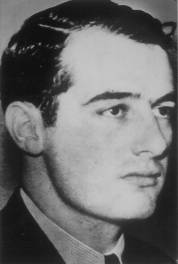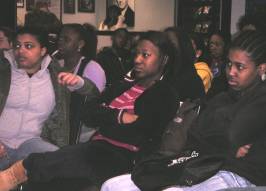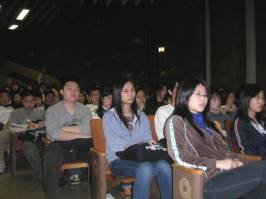Victimization
Just a few days after I started school at the age of seven, I was a witness to victimization. You would think that in 1957 in Sweden there wouldn’t have been many people to victimize, since our country was then a very homogeneous society in the sense that almost all of us were native Swedes. The waves of immigrants and refugees that have flowed over Sweden since the latter part of the last century had not yet built up.
But believe it or not, many found reasons to victimize and harass their fellow men even then. As soon as an individual showed any variations that made him stand out from the herd, the evil face of victimization showed itself. It could be someone who wasn’t born in the area, or who had unusual features, or was overweight. If a person was a Jew only twelve years after the Allied forces stormed into the camps of the Holocaust, there was a big risk that he would be subjected to abuse in Swedish schoolyards.
Never Again!
Since 1945 we have heard over and over again the words ”Never again!” about the Holocaust. We have agreed never to forget that people were annihilated by the Nazis because they had different opinions or beliefs, because they refused to bear arms, because they were handicapped, or were considered to be of an ”inferior race”. The Jews were those who suffered most from the Nazis’ Holocaust. In six years, six million Jews were murdered.
Despite the fact that we have heard the words ”Never again” over and over again, the world has still witnessed genocide several times since the Holocaust. Since the end of World War II, mass murder has been committed in Cambodia, Iraq, Rwanda, and in the Balkan states. If we also count the mass murders of less than hundreds of thousands of individuals, we find even more examples of ”ethnic cleansing” during these years.
A common denominator of genocide is that it starts with lies about the victimized people. The lies turn into mobbing. If the mobbing is organized under obscure political aims, it can rapidly get out of control and lead to mass murder. If we promise ourselves that ”this shall never happen again”, we must take action here and now. It has to begin with you and me. We can never delegate anyone but ourselves to see to it that victimization, which can be followed by genocide, never happens.
To Show Respect to Others
Music is communication. When I began to see that I could reach out to a bigger audience with my music I wanted to tell about things that are important to me. The greatest task we human beings have in front of us, if we want to prevent new genocides, is to learn to show respect for others. The battle against victimization (and mass murder) must start right here and right now – and with you and me.
By sheer chance, and thanks to some clear-thinking adults close to me, I was introduced at the age of seven to the deeds of Raoul Wallenberg and to the battle against victimization and mass murder. Ever since then, the memory of his actions has given me hope and been a model of how we all can fight evil.
Even though Raoul Wallenberg’s deeds were huge ones that allowed him to save thousands of people, he showed that we can start small – right here and now. We can all prevent victimization and genocide by practicing what Raoul did; we can show respect, get to know other people, take a stand for those who are oppressed, and have the courage to get involved. People say about Raoul Wallenberg, ”One man can change the world”. I prefer to broaden the description of his gift to say ”Each and every one of us can change the world”.
Music Is Communication.
During 2004, when I was becoming one of the Swedish Broadcasting Corporation’s most played artists, I wanted to have my dream come true, and that was to write and record some songs for the sixty-year commemoration of Wallenberg’s abduction by Soviet Russian military forces on January 17, 1945. Janne Bark and Mats MP Persson contributed their enthusiastic support as fellow musicians and producers.
The first presentation of my songs was on a national TV morning news program where Janne Bark and I played our music and were interviewed on January 17, 2005. It was an unforgettable morning, especially since Nina Lagergren, Raoul Wallenberg’s sister, was also there to tell about her brother and about her own life-long battle to bring him home.
Although the songs were played often on Swedish radio and TV during the summer and fall of 2005, the silence surrounding Raoul Wallenberg and his deeds soon became closed in again. And yet this happened at the same time as we see an increase in anti-Semitism and victimization in our relatively comfortable society. Faced with this fact, I promised myself in the spring of 2005 to use my opportunities to reach out by going out to schools and companies to talk at least once a month about the Holocaust and Raoul Wallenberg, and about how each and every one of us can fight all that has to do with victimization and genocide. One model for this, our mutual battle, is the one Raoul gave us – to show others respect and consideration, and to have the courage to stand up for our fellow human beings by intervening when others are wronged.
Between Victimization and Genocide
Talking – and singing – about Raoul Wallenberg’s deeds is unbelievably inspiring. It’s one of the few ways I can approach the Holocaust with feelings of hope and confidence. Raoul Wallenberg and his co-workers at the Swedish legation in Budapest were also some of the few rays of hope in Sweden’s actions during World War II. Despite that, many people in our country feel that it is ”uncomfortable” to say too much about Raoul Wallenberg. This attitude is something that hasn’t just hindered me practically from going out and talking about how we can fight evil. It has also perplexed me, and even to a certain extent made me angry. But mostly it has reinforced me in my belief that it’s important to keep the memory of Raoul Wallenberg’s heroic efforts to do battle with everything between victimization and genocide.
Lectures
The presentation takes one hour and includes a picture play, lecture and music. When I talk in schools I prefer to do the presentation in a filled auditorium and I hope that it will be followed with discussions and teaching during the regular teaching.
CD and booklet
As background and support for my lectures I have written an informative brochure about Raoul Wallenberg’s deeds, which is included with the CD of the songs. It has a short introductory description of the Holocaust’s origin and development. The brochure as well as all the song texts is presented in both English and Swedish.
Collaborators
The lectures are not affiliated with any political or religious groups. My ambition is simply to spread knowledge about humanitarian principles. Although I do this on my own initiative and with my own financing, I get great support from my friends in the Association of Holocaust Survivors in Stockholm, the International Raoul Wallenberg Foundation in New York, and especially the Lagergren and von Dardel families.
Prices/fees
Honorary according to agreement. 100% of the honorary will be transferred to my trust that finances trips for teenagers to Auschwitz. I donate a few copies of my CD and brochure to the library of the host institution. If the institution wants to buy copies of the CD and brochure for the audience, they are available at the cost price of $2.50 plus any applicable sales taxes (SEK 15 plus VAT in Sweden).
The songs and the text brochure can also be downloaded free from my website. www.ben-olander.com
Chronological list of presentations
So that you can decide whether the presentation might be suitable for your organization, here’s a chronological list of the places where I’ve done lectures on Raoul Wallenberg and the Holocaust since the spring of 2005. At the end are those that are preliminarily booked for the future.
Time – Institution
- Mar 05 R. W. Academy for Young Leaders, Gothenburg High school
- April 05 Förenade Well Kappa AB Company
- April 05 Plönningegymnasiet, Halmstad High school
- May 05 Lidingö kyrka Church
- May 05 Djursholms Gymnasium High school
- May 05 R.W. Academy for Young Leaders, Stockholm High school
- Sept 05 R.W. Academy for Young Leaders, Stockholm High school
- Oct 05 Smurfit Kappa AB Company
- Nov 05 Walterska Gymnasiet, Halmstad High school
- Dec 05 Norregårdsskolan i Växjö High school
- Jan 06 Immanuelkyrkan, Stockholm Church
- Feb 06 The Raoul Wallenberg School, Brooklyn Grade school
- Feb 06 United Nations, New York Peace organization
- Mar 06 The John Lindsey Wild Cat Academy, N.Y. High school
- Mar 06 Meridi School, New York High school
- Mar 06 Colombia University, New York University/ High school
- May 06 Smurfit Kappa AB Company
- May 06 Harplinge församling Church
- July 06 Söndrums/Wapnö församling Church
- Aug 06 Judiska Freslogen, Stockholm Discussion group
- Aug 06 Folkpartiet i Göteborg Political party
- Sept 06 Raoul Wallenbergsgymnasiet, Bromma High school
- Sept 06 Stockholms Universitet University/ Discussion group
- Oct 06 Teaterstudio Lederman, Stockholm Theater/Own production
- Oct 06 Hagagymnasiet, Borlänge High school
- Oct 06 Maximteatern, Borlänge Theater/Own production
- Nov 06 The Yeshiva Torah School, Long Island Grade school
- Nov 06 Svenska kyrkan på Manhattan Church
- Nov 06 The Royal Bachelors Club, Gothenburg Men’s club
- Dec 06 Föreningen Förintelsens Överlevande Discussion group
- Dec 06 Judiska vänföreningen i Stockholm Discussion group
- Jan 07 RIA-gården Rehabilitation center
- Jan 07 Röingeskolan, Karlskrona High school
- Jan 07 Borlänge Kommun Municipality/Public place
- Jan 07 Wasabryggeriets vänner, Borlänge Theater/Own production
- Feb 07 Halmstads församling Church
- Feb 07 Åsa gymnasium High school
- Feb 07 Åsa PTA PTA
- Mar 07 R.W. Academy for Young Leaders, Gothenburg High school / Discussion group
- Mar 07 Halmstads teater ”The Triumph of Life” Theater/Own production
- April 07 Smurfit Kappa Company
- May 07 R.W. Academy For Young Leaders, Stockholm High school / Discussion group
- May 07 Gothenburg Kommun Municipality
- Oct 07 The Swedish American Institute, Minneapolis Institute
- Nov 07 The Gustav Adolphus University, Minneapolis University
- Nov 07 The Swedish Church Manhattan Church
- Nov 07 The SAR Yeshiva Torah, School, Bronx Grade School
- Nov 07 Halmstads församling Church
- March 08 Lilla Akademien, Stockholm High School
- April 08 American Swedish Inst. Fargo, North Dakota Multi Cultural Institute
- June 08 Tullhusparken, Dalarö Official Municipal Park
- May 08 Pensionärsuniversitetet, Halmstad Educational inst for seniors
- Oct 08 ”Livgivande företagare” Club for executives
- Oct 08 Teaterstudio Lederman, Stockholm Teater/Own production
- Dec 08 The Executive Club, Halmstad Club for executives
- Jan 09 Rotary, ”Svea”, Halmstad Rotary Club







